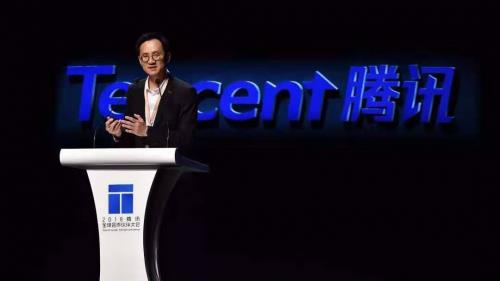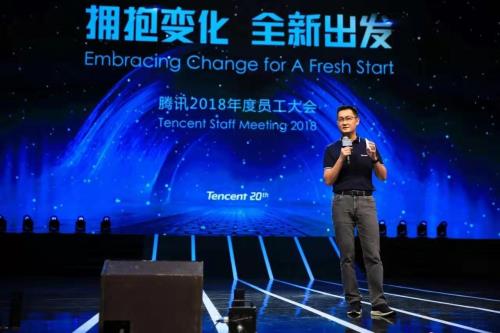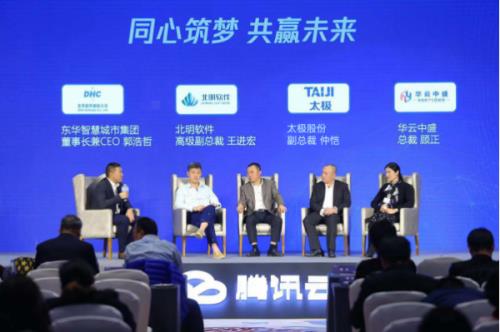In the past ten years, three moments of Tencent’s cloud life hanging by a thread
No one expected that the hot "stealing vegetables" game in 2009 would lead to the explosion of Tencent Cloud.
What is even more surprising is that Tencent Cloud, which has been dormant for 10 years and was once not optimistic, will now become Tencent’s first starting point to solve the midlife crisis, and it is also a major weapon for Tencent, Alibaba, and Huawei in the industrial Internet PK.
"Stealing Vegetables" Stolen Tencent Cloud
In 2009, Tencent was still a medium-sized company, and QQ space was still a non-mainstream camp of the post-80s and post-90s generation. At that time, QQ farms were introduced into QQ space, setting off a national rush to steal vegetables.
But behind the explosion of the game of stealing vegetables, it is Tencent’s team of programmers who are working hard to maintain it. The system of QQ farm is like a canal in a farmland, and users are like watering water. If the water storage capacity of the canal is not large enough to withstand the flood of hundreds of millions of users stealing vegetables at the same time, the system will naturally collapse.

In order to support the normal operation of QQ Farm, Tencent purchased and put thousands of additional servers on the shelves in just one month, and it became a common thing to add 4,000 servers a month.
The incident of "QQ Farm Stealing Vegetables" enlightened Tang Daosen and his colleagues, the technical head of QQ Space at the time. Not every company can keep adding servers, and not every company has the need to keep using these servers. If the game is not popular, these servers are equivalent to idling.
Is there a way to solve this problem?
At that time, a series of academic papers on the GFS architecture were published abroad, and the team of Tang Daosheng and Yao Xing analyzed the technical details and developed a new set of low-level data storage methods based on the actual needs of the business. After this creative method was abstracted, it was generally applicable in other businesses, so that other technicians did not need to redesign the system at this level.
This is the embryonic form of Tencent Cloud.
Two opinions, life on the line
The process of Tencent Cloud gradually flourishing was not smooth sailing, and soon, two opinions emerged within Tencent.
One side is to stop the business, and the cloud is a "hard work of mining coal". There is no profit, heavy investment, high cost, unclear long-term development, and its own business has been in a very low state. The other side is to argue that the cloud is a business that cannot be easily abandoned.
Tang Daosheng defied all arguments and has been insisting on moving around with limited resources, giving Tencent Cloud a chance to survive.

It wasn’t until around 2011 that Tencent realized that it was time to open up its industrial ecosystem and gain more partners. To achieve this goal, in addition to sharing the huge traffic of QQ and WeChat, it also needs to provide more solid technical capabilities to partners.
Tencent Cloud finally has the opportunity to make an appearance!
In a public interview, Mr. Tang explained the relationship between Tencent Cloud and the open ecosystem. "When you really open up traffic to the outside world, you find that the back-end support capabilities of these partners are relatively poor. Even if I can guide tens of millions or even hundreds of millions of groups to you, if you can’t catch it, it will collapse. And [Tencent Cloud] is the ability of Tencent to serve a large number of users accumulated over more than a decade. So, open up IT capabilities to partners as well."
The most impressive thing was the subsidy war of Didi Kuaidi that year. Didi’s order volume rose dozens of times in a short period of time, and servers in various places were in a hurry.
"When Didi’s server hangs up, users will flock to the fast one. The fast server hangs up immediately, and users will flock back, and Didi will hang up." The parties recalled that whoever’s server stabilizes, users will settle down.
After receiving Didi’s call for help, Tencent and Didi’s technical team fought for 7 days and 7 nights. The engineers were too busy to take a shower and stinked, and finally withstood the battle that decided the survival of the two families. Then Didi quickly migrated the system to Tencent Cloud, withstood several traffic peaks, and finally had the last laugh in the online car-hailing war.
In 2018, Tencent was on the cusp of the trend again. Based on this timing, Pony Ma, who has long been on the stage for Tencent Cloud, spoke out. In a small box in a Hong Kong restaurant, Pony Ma asked strategic questions such as "whether the cloud is the most important for Tencent" in one breath. These questions made every member of the general office disarm.

A few days later, at an expanded meeting attended by more than 40 vice presidents, Liu Chiping, president of Tencent Group, asked: "I think the cloud business is very important to the future development of the company, and the company must do it. Please raise your hand."
All hands raised.
"Okay, you support it." Lau Chiping smiled, and after the meeting, the vice presidents realized that this was a "gun surrender" conference.
Anticipating that "surrender the gun" might encounter resistance, Lau Chiping specially arranged this session, so that everyone had no room to bargain. "Which department should be taken from, and when it comes to cloud (CSIG business group), there are no conditions."
Since then, from the "general manager" to the core executives, the view has been formed that the Internet has entered the second half of the TO B, the cloud is the most important strategic tool, and it is time to unleash the power of Tencent Cloud. Subsequently, Tencent announced the restructuring, and the Cloud and Smart Industry Group (CSIG) was born, focusing on the industrial Internet, as the pioneer of the new blueprint of Tencent.
Pony Ma opened the "green light" to enter the 2B market
Pony Ma is optimistic about the future of Tencent Cloud. He has always been cautious about WeChat entrance, and has business to try to get it. Before Zhang Xiaolong speaks, Pony Ma will rush to refuse. But this time, Pony Ma helped Tencent Cloud find Zhang Xiaolong to get WeChat entrance.
This detail makes Mr. Tang more confident. On the cloud track, Mr. Tang quickly ran, and the first arena was the game cloud. Tencent is the world’s largest game company, which is its ecological advantage.
The life cycle of a game is short, and it usually dies out after two or three years. However, in order to maintain the operation of a game, the operating company has to lay out a district and hundreds of servers. And Tencent Cloud can help game companies save these resources and provide a complete set of game services.
Taking "Honor of Kings" as an example, Tencent Cloud has studied how to do mobile phone evaluation for games, how to do numerical system and game rating, how to do a good voice call system and other services, all packaged and provided.
Soon, Tencent Cloud became the leading player in the gaming cloud market.
In the field of live broadcast, real-time audio & video technology based on QQ social services has always been Tencent’s technical advantage. From video calls to group videos to live video broadcasts, Tencent’s accumulated IT capabilities in this field soon gained explosive output opportunities with the arrival of the first year of live broadcast. So soon, in 2017, Tencent Cloud firmly occupied the first position of live broadcast cloud.
Then Tencent Cloud also made efforts to enter the field of government affairs, developing the "Guangdong Provincial Affairs" Mini Program. Today, one out of every 16 Cantonese people uses the "Guangdong Provincial Affairs" Mini Program, and 625 people handle business through Guangdong Provincial Affairs every minute. As of 2019, Tencent Cloud and partners have landed multiple large-scale government affairs projects in 22 provinces.

With the advantage of 2C ports, Tencent Cloud has fought one good battle after another in 2B ports. In fact, 2B is still very close to daily life. For example, Tencent Cloud’s technology allows multiple people to communicate in real time, minimize noise and echo, reduce the delay time of foreign calls, and allow leasing parties to sign online contracts.